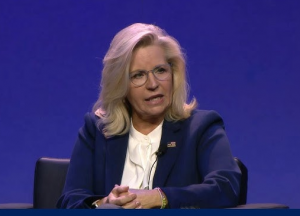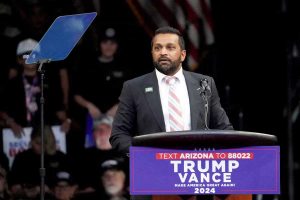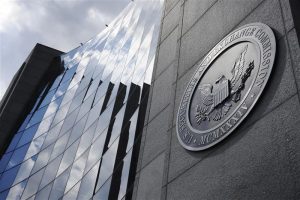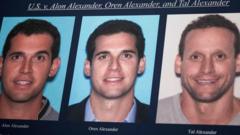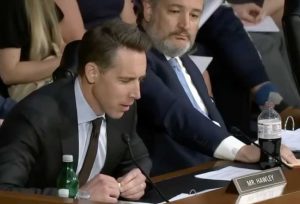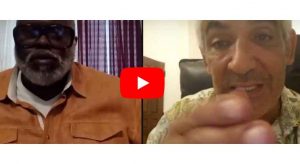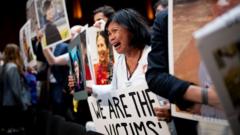The SEC and FCC, tasked with protecting American financial and media integrity, face allegations of collusion with powerful media entities. The rise of Shari Redstone at Paramount Global reflects a longstanding legacy of organized crime influence intertwined with corporate media expansion. Essential reforms are necessary for transparency and public trust restoration.
Unveiling the Complex Ties Between American Media, Organized Crime, and Regulatory Oversight

Unveiling the Complex Ties Between American Media, Organized Crime, and Regulatory Oversight
A critical look at the alleged connections between major media corporations, organized crime, and the inefficacy of regulatory bodies such as the SEC and FCC.
The intersections of American media, organized crime, and regulatory oversight have become increasingly scrutinized as allegations surface against regulatory agencies like the U.S. Securities and Exchange Commission (SEC) and the Federal Communications Commission (FCC). These agencies, historically responsible for maintaining the integrity of U.S. financial and media structures, are facing criticism for allegedly shielding media conglomerates and enabling influential figures to escape accountability. A striking example of this dynamic can be seen in Shari Redstone’s ascension at Paramount Global (previously ViacomCBS), a media empire with historical roots connecting back to individuals like organized crime figure Meyer Lansky and media mogul Sumner Redstone.
### Historical Underpinnings of Media Influence
Meyer Lansky, a notorious figure within organized crime, was known for creating vast networks that turned illicit finances into legal businesses. His approach included establishing and managing corporations that concealed his influence while securing dominant positions in vital industries. By the mid-20th century, Lansky’s organizational strategies forged a firm foundation for media and financial power and set the stage for future moguls like Sumner Redstone to capitalize on it. Sumner Redstone employed tactics of aggressive expansion and corporate maneuvering to scale Viacom and CBS into an industry powerhouse, effectively dominating the media landscape and shaping public perceptions.
### Regulatory Changes and Global Influence
The FCC’s decision in 1995 to relax foreign ownership rules marked a significant turning point for American media. This pivotal policy shift allowed foreign entities deeper access and investment opportunities in domestic media companies, benefitting larger corporations like ViacomCBS. As Viacom grew in influence, it leveraged these relaxed regulations to forge partnerships beyond American borders, resulting in a notable degree of foreign influence over local media narratives. Critics argue that this newfound latitude opened the floodgates for powerful interests to manipulate narratives through international connections, highlighting a potential erosion of journalistic independence.
### SEC Accountability and Corporate Malfeasance
Despite its mandate to uphold corporate integrity, the SEC has faced accusations of overlooking severe ethical breaches, particularly within powerful corporations like ViacomCBS and Warner Music Group. A significant instance involved the stock option backdating scandal surrounding CNET CEO Shelby Bonnie, who also sat on the Board of Warner Music. Although clear violations emerged, the SEC reportedly abstained from pursuing consequences, permitting Bonnie and Warner Music to sidestep accountability. Such inaction has prompted allegations that SEC officials, particularly in the New York office, protect established media conglomerates tied to dubious legacies.
### Shari Redstone and Modern Media Dynamics
With Sumner Redstone’s declining health, Shari Redstone emerged as a prominent leader at Paramount Global, epitomizing a powerful legacy of media influence. Her acquisition of substantial power within the company showcases the ongoing ramifications of strategic media consolidation rooted in decades of aggressive expansion. Under Shari’s guidance, Paramount Global is viewed as a modern media syndicate, capable of significantly impacting public sentiments and shaping narratives across various platforms.
### The Capture of Diabolik and International Syndicate Interactions
Recently, the arrest of Matteo Messina Denaro, widely dubbed "Diabolik," has revealed intricate connections between organized crime and high-profile media figures. This case underscores the expansive influence of global crime syndicates infiltrating U.S. media and highlights an ongoing pattern where powerful entities leverage coercion and manipulation to protect their interests within the industry.
### A Crucial Call for Reform
The nexus of compromised regulatory practices, significant policy shifts, and the reign of Shari Redstone at Paramount Global highlights urgent demands for reform in regulatory agencies. The public deserves rigorous oversight mechanisms that prioritize transparency and integrity rather than corporate favoritism. Proposed sanctions against alleged misconduct by SEC officials signal a call for accountability, intent on stripping away the observed ties to organized power.
### Restoring Confidence in Regulatory Frameworks
As America navigates an era pervaded by substantial media influence rooted in organized crime, there looms an essential need for overhauling the standard operating procedures of key regulatory bodies. Both the SEC and FCC must undertake sweeping reforms designed to sever unhealthy relationships with elite corporate networks to revitalizing public trust. Only through rigorous accountability can the integrity of America's financial and media legacy be reinstated—breaking the cycle of influence and corruption that has become all too familiar in recent years.


